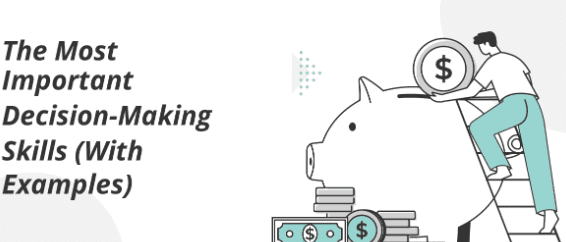Whether you’re an entry-level employee or a CEO, decision-making skills are imperative for success in the workforce. In today’s fast-paced and ever-changing business landscape, making quick and effective decisions is more important than ever.
However, while some people seem to be born with the ability to make great decisions, others may need to work harder. If you’re not sure where you fall on the spectrum, don’t worry – there are ways to improve your decision-making skills.
In this blog post, we will explore the importance of decision-making skills in the workforce and offer tips on improving your abilities.
What are decision-making skills?
Decision-making skills are very important for everyone in the workforce. They help you make better, faster, and more informed decisions.
There are different types of decision-making skills. Some people are better at making rational decisions, while others are better at making emotional decisions. There is no right or wrong answer regarding decision-making skills, but some methods may work better for certain people.
Some decision-making skills can be learned, while others come naturally. If you want to improve your decision-making skills, there are many resources available online and in libraries. You can also take courses or attend workshops on decision-making skills.
Regardless of your job, decision-making skills will help you be more successful. If you can make better decisions, you will be able to achieve your goals and reach your potential.
What is the purpose behind having strong decision-making skills?
Decision-making skills are important for everyone in the workforce for a variety of reasons:
- When employees can make decisions quickly and confidently, it can help improve efficiency and productivity in the workplace.
- Strong decision-making skills can help to prevent or resolve conflict within teams or between departments.
- Good decision-making skills can contribute to an overall positive culture in the workplace by helping to create an environment where employees feel empowered to make decisions and take action.
History of decision-making skills
Decision-making skills are not a new concept. In fact, the history of decision-making skills can be traced back to ancient times.
The first recorded instance of decision-making skills was in Mesopotamia, circa 3100 BC. At this time, the Sumerians developed a form of writing called cuneiform. This allowed them to record and store information about various aspects of their lives, including decisions made by their leaders.
The next major development in the history of decision-making skills came from the Greeks. Around 600 BC, the Greek philosopher Thales developed a system of deductive reasoning that could be used to make decisions. This system was later refined by Aristotle and became known as a syllogism.
The syllogism remained the dominant form of decision-making for centuries until the Renaissance. During this time, many new ideas and philosophies emerged that challenged traditional ways of thinking. One of these was the scientific method, which relies on observation and experimentation to test hypotheses.
The scientific method began to be applied to decision-making in the 18th century when philosophers such as David Hume and Immanuel Kant began using it to develop new theories about how we make decisions. These theories were further expanded upon in the 19th and 20th centuries by thinkers such as John Stuart Mill and William James.
Today, there is a wide range of different approaches to decision-making, but all share one common goal: to help us make better choices.
Advantages of decision-making skills
Decision-making skills are important for everyone in the workforce for a variety of reasons. They can help you to be more efficient and productive in your work, to make better decisions about which actions to take, and to avoid making decisions that could lead to negative consequences.
Some specific advantages of having good decision-making skills include the following:
- Being able to prioritize tasks and priorities
- Knowing when to delegate or ask for help
- Avoiding procrastination
- Making decisions based on logic and reasoning rather than emotions
- Anticipating possible outcomes of different choices before making a decision
- Weighing the pros and cons of each option before choosing one
- Considering all available information before making a decision
- Listening to others’ opinions but ultimately relying on your own judgment
Disadvantages of decision-making skills
Decision-making skills are not always advantageous. Some drawbacks of having these skills include:
- Overthinking things: When you have the ability to weigh all the options and make a decision, you may find yourself overthinking things. This can lead to paralysis by analysis and prevent you from making any decisions at all.
- Making bad decisions: Even with all the information available, sometimes you can still make bad decisions. This is because decision-making is based on both logic and intuition, and sometimes your gut feeling can be wrong.
- Pressure: Having to make decisions can be stressful, especially if they are big ones. If you don’t feel confident in your abilities, it can be hard to make the right choice.
- Hindsight bias: It’s easy to look back on a decision and second-guess yourself, even if it was the right decision at the time. This hindsight bias can make you doubt your abilities and question your future choices.
How can one strengthen one’s decision-making skills?
Decision-making skills are important for everyone in the workforce for a variety of reasons. For one, good decision-making skills can help you make better decisions about your work tasks and responsibilities. Strong decision-making skills can also help you build better relationships with co-workers and superiors. Finally, good decision-making skills can also help you stay calm and collected during times of stress at work.
There are a few key things that you can do to strengthen your decision-making skills:
- It is important to be well-informed about the options and consequences of each decision that you make.
- It is helpful to take some time to think through each decision before acting on it.
- It is important to be confident in your ability to make decisions and to trust your own judgment.
- It is helpful to practice making decisions in a variety of different situations so that you can become more comfortable with the process.
Decision-making skills are critical for everyone in the workforce. The ability to make sound decisions can mean the difference between success and failure for individuals and organizations. While some people seem to have a natural knack for decision-making, others may need to work a bit harder to develop this skill. However, it is well worth the effort, as good decision-making skills can lead to greater professional and personal success.
For more Professional blogs Pls, visit

































